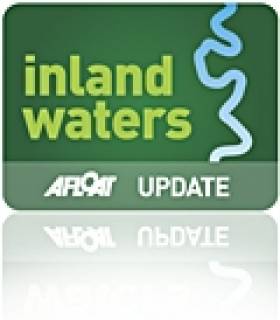Displaying items by tag: Customs House Quay
Barge History Reveals 80–Foot Theatre Vessel Has Colourful Past
#barge – It is to take up a new berth in Lough Derg next week, but the history of a barge docked at Customs House Quay as a performance theatre is every bit as colourful and exciting as the play it's hosted over the past three weeks writes Andrew Carey.
The 80–foot barge "Spera in Deo" (Trust in God) or "T82" was built in Holland in 1895 and although used as a cargo vessel, the records show she was originally a sailing ship.
Converted to a mussel dredger in 1924 by the Blommaert family in Zierikzee, the boat remained in Holland until 1983 when it was brought to Kerry where it operated for a number of years. It left the southern shores for Greencastle in Donegal where it became one of the first dredgers to fish mussels on the River Foyle.
A major overhaul of the historic vessel was undertaken by a Donegal entrepreneur who used it for recreational purposes for a number for years before a fire destroyed the engine and caused extensive smoke and fire damage.
She lay stricken, afloat and for sale before the keen mariner's eye of Robert McGrath from Achill Island saw the vessel and with it an opportunity to transform it into something special.
Emma D'Arcy, co-owner of the historic barge, said that as the insurance company had paid a six figure sum to the previous owner, it was to be sold as a hull.
"Robert loved it and over the course of a week decided that the best thing to do was to go back up to Donegal to see if he could get it going. Hours of labour and meticulous work led to the engine spluttering back life.
Over eight months later, the barge was seaworthy enough to navigate up the Shannon estuary.
"Rob had to wait patiently for good weather before he could make the perilous journey from Donegal down the west coast to Foynes and eventually into Limerick. It took several weeks for a 48 hour weather window that would allow the crew to make the journey.
In the meantime, Limerick playwright Helena Enright, who was putting the finishing touches to 'The River', a multi-sensory theatrical experience about the river Shannon, had heard that the barge was en route.
"She approached us to see if we would be interested in letting her use the barge for a couple of weeks to stage her play about the river and its effects on its inhabitants over the years", Emma explained.
"Helena was thrilled as there are actually very few vessels in Limerick itself and anything she found was too small, sunk, or had people living onboard".
Moored in Limerick as a floating theatre, Spera in Deo will begin the next phase of its colourful history when it moves to Dromineer next week.
























































